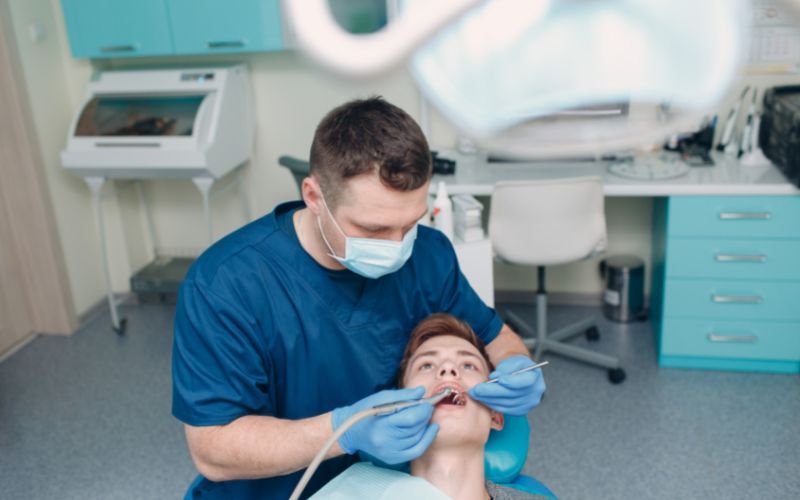What is tooth decay: Learn about its symptoms, treatments and how to prevent it
Tooth decay is a common dental disease in which acids produced by bacteria in the mouth break down tooth enamel and create a cavity in the tooth.
Tooth decay can affect people of all ages and if left untreated, can cause pain, infection, abscesses and tooth loss.
Prevention is the best way to avoid tooth decay, which includes good oral hygiene, limiting sugary foods and drinks, eating foods rich in calcium and vitamin D, and visiting the dentist regularly.
In this article, we will discuss the causes, symptoms, treatments and prevention of tooth decay.
🦷Types of tooth decay
There are several types of dental caries, which can be differentiated by their location and the severity of the disease. Types include:
🦷Coronal caries: This is the most common form of dental caries, which forms on the surfaces of the teeth (occlusal), where chewing occurs
🦷Root caries: This occurs at the root of the tooth, which can be exposed if the gum is pulled back
🦷Fissure caries: Forms in the deep fissures and grooves of the back teeth, where bacteria can become trapped and difficult to remove
🦷Neck caries: Occurs at the line where the tooth meets the gum, due to exposure of the root of the tooth
🦷Recurrent or secondary: These are lesions that form around the place where caries had previously been treated. They may appear due to poorly applied treatment
Stages of dental caries This you should know!🔎
Dental caries develops in several stages, from the initial phase to advanced caries. Let's read this whole process carefully, so we can know how to prevent it.
🚀Initial stage: Tooth decay forms as white or brown spots on the surface of the tooth. These spots may be difficult to see without a dental checkup, but they are an early sign of tooth decay
Surface decay: At this stage, tooth decay has spread beyond the enamel and has begun to affect the dentin. Superficial caries can cause tooth sensitivity, especially when consuming hot or cold foods or drinks
Deep decay: When decay deepens, it can reach the nerve of the tooth, which can cause severe pain and tooth sensitivity. At this stage, root canal treatment may be necessary to save the tooth
Advanced decay: If tooth decay is not treated early, it can lead to tooth loss and much more serious oral health problems
Symptoms of caries
The symptoms of dental caries may vary depending on the stage of the disease and the location of the decay.
Some of the most common symptoms include:
Tooth sensitivity: If teeth hurt or are sensitive to cold, heat or sweets, this may be a sign of tooth decay
Toothache: If teeth hurt when chewing or when touched, this may be a sign of advanced tooth decay
White or brown spots on the teeth: This may be a sign of early tooth decay
Holes in the teeth: If you can see or feel a hole in a tooth, this may be a sign of advanced decay
❌Causes and consequences of dental caries
Tooth decay is caused by a combination of factors, including diet, oral hygiene and genetics. Bacteria in the mouth
consume sugars and carbohydrates to produce acids that break down tooth enamel. If oral hygiene is insufficient, bacteria can accumulate on the tooth surface and multiply, increasing the risk of tooth decay.
The consequences of untreated tooth decay can be serious. Advanced decay can cause pain, infection, abscesses and tooth loss.
They can also affect self-esteem and quality of life, as they can make it difficult to eat, speak and smile.
What are the treatments for dental caries?
The treatment of dental caries depends on the severity of the disease. In the initial phase, caries may be reversible by remineralization of tooth enamel.
This can be achieved by a healthy diet, reduction of sugars and carbohydrates in the diet, and good oral hygiene.
⚠️Nota important: If the cavity is just forming it may be possible to stop this process with the help of fluoride. If the cavity has formed it is necessary to remove all the infected tissue; after this, composite or other material is used to reconstruct and close the cavity. ProDent is your best solution when it comes to tooth decay removal!👌
While in the more advanced stages, treatment may involve removal of damaged tooth tissue and placement of a dental filling to restore tooth form and function.
If the decay has reached the dental pulp, root canal treatment or tooth extraction may be necessary.
How to prevent dental caries?
Prevention is the best way to avoid tooth decay. Some tips for preventing tooth decay include:
✅Maintain good oral hygiene: brush teeth twice daily with fluoride toothpaste, floss daily and rinse mouth with an antibacterial mouthwash
✅Limit sugary foods and drinks: Reducing consumption of sugars and carbohydrates can reduce the risk of tooth decay
✅Consume foods rich in calcium and vitamin D: Foods such as milk, cheese, and yogurt can strengthen tooth enamel and reduce the risk of tooth decay
✅Seeing the dentist regularly: Regular dental checkups can detect and treat tooth decay early, before it becomes a serious problem
If not treated in time, tooth decay can cause pain, infection, abscesses and tooth loss.
Prevention is the best way to avoid tooth decay, which includes good oral hygiene, limiting sugary foods and drinks, eating foods rich in calcium and vitamin D, and visiting the dentist regularly.
If tooth decay is detected early, it may be reversible through remineralization of tooth enamel. In more advanced stages, dental treatment may be necessary to restore the form and function of the damaged tooth.
Are you suffering from problems related to dental caries? ProDent offers you the best treatments, leaving your oral health in the hands of the best dentists in Tijuana.




